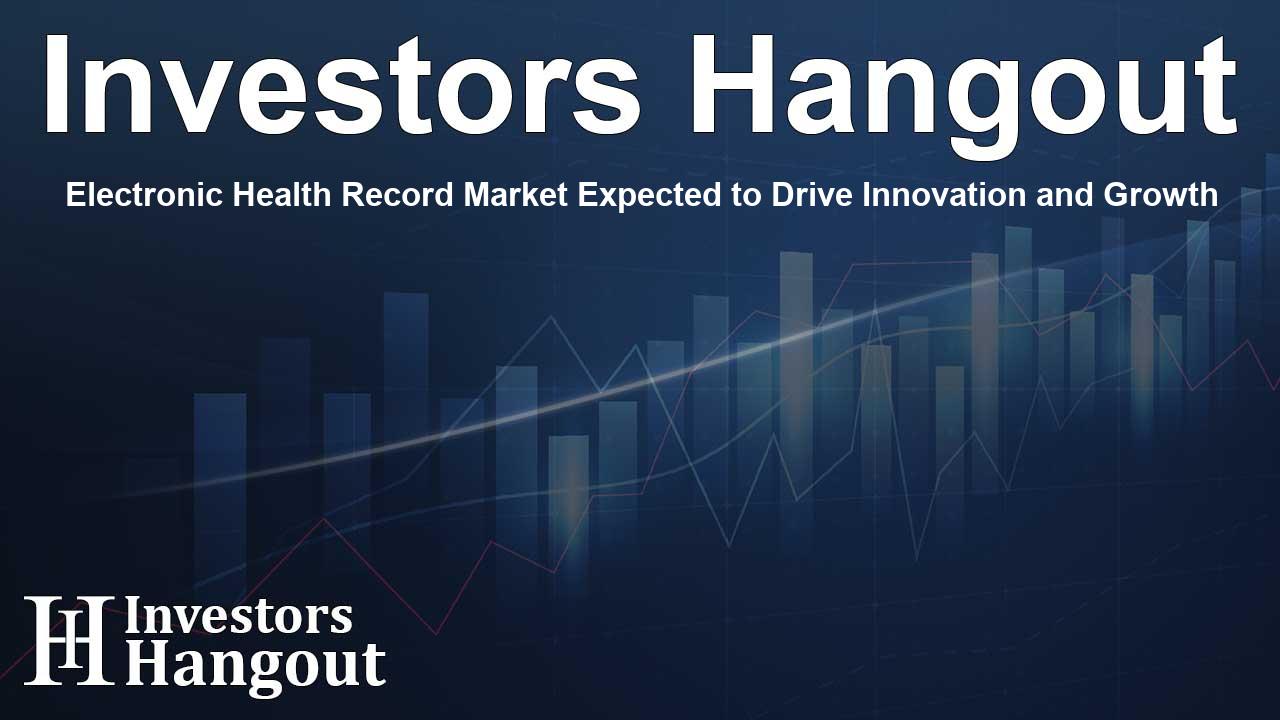Electronic Health Record Market Expected to Drive Innovation and Growth

Overview of the Electronic Health Record Market
Electronic health records (EHR) are transforming the healthcare landscape, making significant strides toward a more integrated system of healthcare management. With a projected market value of around USD 54 billion, the rise of EHR systems is largely fueled by the increasing need for real-time patient data, which is essential for managing chronic diseases and improving overall patient care.
Current Trends Driving EHR Adoption
The surge in chronic illnesses around the world necessitates ongoing monitoring and effective long-term care strategies. In response, healthcare systems are increasingly investing in technologies that facilitate immediate access to patient information across various platforms. Governments are also playing a crucial role by establishing supportive policies, regulations, and funding initiatives aimed at promoting EHR adoption. This momentum is supported by large companies investing heavily in advanced, user-friendly EHR solutions that utilize artificial intelligence and data analytics to improve healthcare delivery.
Advantages of EHR in Healthcare
One remarkable advantage of EHR systems is their ability to offer comprehensive health records that encompass medical histories, diagnoses, medications, allergies, and lab results—all accessible at the click of a button. This leap from traditional paper records to digital formats enhances coordination among healthcare providers and reinforces patient safety by reducing errors. Furthermore, EHR systems bolster patient engagement, as they allow individuals to access their health information through secure online portals, encouraging proactive participation in their own care.
Market Dynamics and Challenges
Despite their significant benefits, the EHR market faces notable challenges, such as high implementation costs, varying interoperability among systems, and data privacy issues. Ongoing debates around user dissatisfaction point out that while EHRs streamline many processes, they also introduce administrative burdens that some healthcare providers find cumbersome. To combat these challenges, there's a growing focus on integrating AI and natural language processing to automate tasks, thus improving user experience.
Regional Insights on Market Growth
North America has emerged as a leading region in the EHR market, primarily due to an aging population and a surge in chronic diseases. The increasing adoption of telehealth services is another contributing factor, as it emphasizes the need for integrated digital health solutions. Support from government initiatives aimed at boosting digital health literacy further fuels market expansion. Companies in this space, like Epic Systems Corporation, Oracle, and athenahealth, are developing innovative EHR solutions tailored to meet the unique demands of various medical specialties.
Future Outlook and Potential Innovations
The future of electronic health records looks promising, with continued enhancements anticipated in usability and technology. As healthcare becomes more data-driven, the integration of EHR systems with cloud computing offers new possibilities for scalability and accessibility. Practitioners can now access comprehensive health data instantly, fostering a more collaborative approach to patient care and ultimately reducing the frequency of hospital visits for chronic disease management.
Key Players in the Electronic Health Record Market
Several key players in this space include Epic Systems Corporation, Oracle, and athenahealth, each contributing significantly to the evolution of EHR technologies. Their commitment to innovation and addressing user needs will be pivotal in shaping the next wave of medical technology in healthcare settings.
Conclusion
The electronic health record market is on the brink of transformative growth, with multiple factors contributing to its future success. As industry stakeholders work collaboratively to tackle existing challenges and innovate solutions, EHR systems will remain crucial in advancing patient care and enhancing overall healthcare efficiency.
Frequently Asked Questions
What is an Electronic Health Record?
An electronic health record (EHR) is a digital version of a patient’s paper chart. It contains comprehensive health information and is accessible by authorized healthcare professionals across various settings.
What are the main benefits of using EHRs?
EHRs improve patient care by providing real-time access to health records, enhancing coordination among healthcare providers, reducing errors, and empowering patients through better engagement.
What challenges does the EHR market face?
Challenges include high implementation costs, interoperability issues, user dissatisfaction, and concerns regarding data security and privacy.
Who are the leading companies in the EHR market?
Major players include Epic Systems Corporation, Oracle, and athenahealth, among others, who are continually innovating to enhance their EHR offerings.
What does the future hold for EHR systems?
The future of EHR systems looks promising, with technological advancements and increased adoption expected to further enhance efficiency, data accessibility, and patient care management.
About The Author
Contact Henry Turner privately here. Or send an email with ATTN: Henry Turner as the subject to contact@investorshangout.com.
About Investors Hangout
Investors Hangout is a leading online stock forum for financial discussion and learning, offering a wide range of free tools and resources. It draws in traders of all levels, who exchange market knowledge, investigate trading tactics, and keep an eye on industry developments in real time. Featuring financial articles, stock message boards, quotes, charts, company profiles, and live news updates. Through cooperative learning and a wealth of informational resources, it helps users from novices creating their first portfolios to experts honing their techniques. Join Investors Hangout today: https://investorshangout.com/
The content of this article is based on factual, publicly available information and does not represent legal, financial, or investment advice. Investors Hangout does not offer financial advice, and the author is not a licensed financial advisor. Consult a qualified advisor before making any financial or investment decisions based on this article. This article should not be considered advice to purchase, sell, or hold any securities or other investments. If any of the material provided here is inaccurate, please contact us for corrections.
